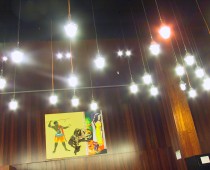Finally got through page 20 on this one yesterday and finished today. I started it in December — then Trump happened.
Preparing for international women’s day. pic.twitter.com/uIUEPB1jlp
— Amol Sarva (@amol) March 5, 2017
But you can’t live on the news alone. History and deeper structure matter. And this Top Secret, Never-Before-Told story about Wonder Woman has some really good stuff — about changing society for the better.
Here are eight things I learned:
1. Marston, the guy who created WW, was a most interesting and weird dude at the forefront of many fields in the early 20th C: psychology, lie detectors, psychometrics, advertising as influence, Hollywood audience testing, racial bias in trials, free love, the working woman and women’s rights. He taught/studied at Harvard, Tufts, American University, Columbia and more. He started many companies, wrote many articles, came up with lots of ideas, failed a lot — A LOT and in embarrassing ways — but was generally on the right track on all this stuff.
2. The women’s rights movement had from the very outset a conflict between “Women Are Better” (sensible, peaceful, empathetic, etc.) and “Women Are the Same” (equal rights, suffrage, work opportunities). This “internal” conflict has not gone away I don’t think (e.g., Should Wonder Woman dress less sexy/tawdry or should she dress any damn way she pleases?)
3. Margaret Sanger and her sister Ethel Byrne were absolute badasses.
4. These “movement leaders” profiled in the book remind me of the crazy people who invent *anything* — irrational, boundary-busting, non-conformists, petty criminals, obsessed, but *right* and irresistible. Sanger was certainly like this.
5. The power of nonviolent movements is amazing. Women’s Rights happened due to marches, hunger strikes, beatings, letters, etc etc.
6. The heart of women’s rights early on was suffrage, then the key battle was birth control. Without birth control, people were dying. Sanger’s mother had a dozen kids — many of them semi-orphaned and not cared for, their father was a drunk, and their mother did die early. You can’t have a dozen children. It can’t be up to whatever madman husband you get. It’s insane. You have to have choices about whether you want to start and keep getting pregnant and having children. *It’s completely obvious that the abortion battle to this day is the granddaughter of this basic civilizational struggle for women to just decide their own lives, period.*
7. And…re: Wonder Woman who this book is only kind of about — she was created in 1939 as WW2 got going, and was a patriotic symbol of Marston’s dream – a super woman showing what women can be about.
8. Also, it must be noted that Mayer’s master narrative is “Marston’s girlfriend, Olive Byrne who had a few children with him and collaborated with him throughout most of his life, who worked alongside him and his wife, that Olive Byrne is largely forgotten from the history and her role in all that.” She was indeed an interesting woman.
